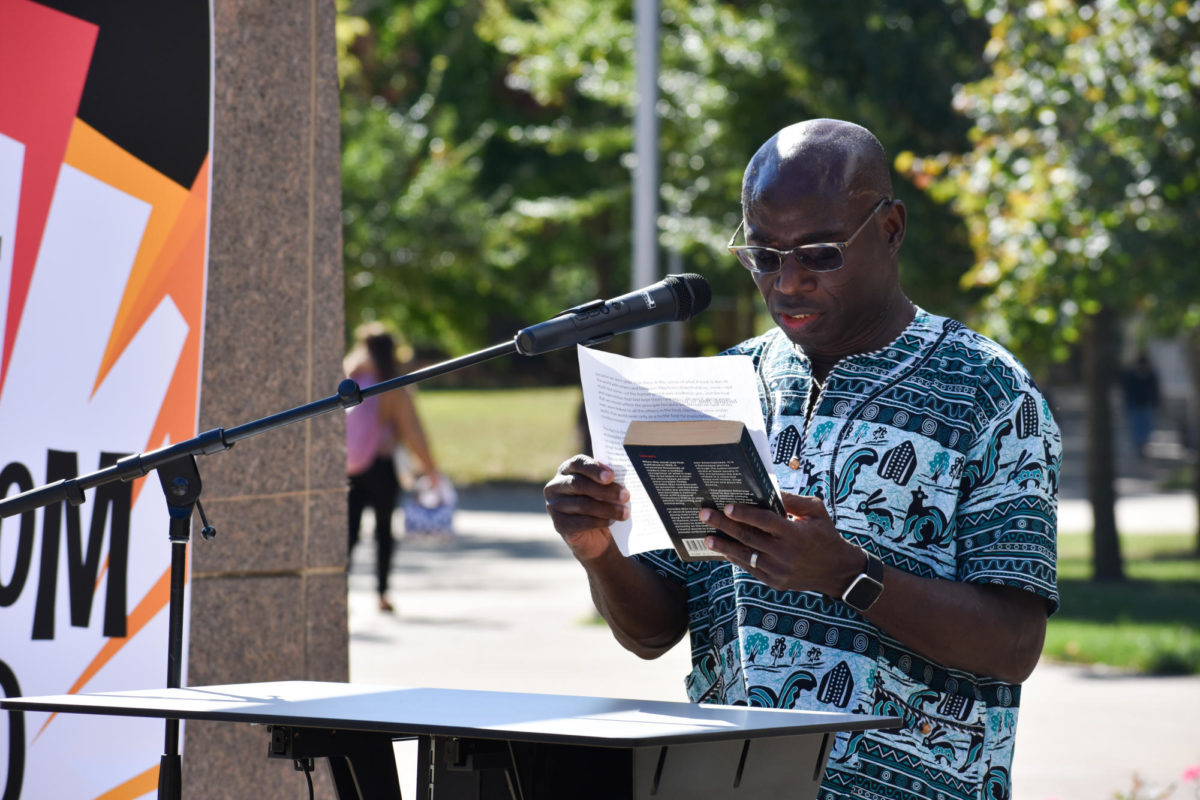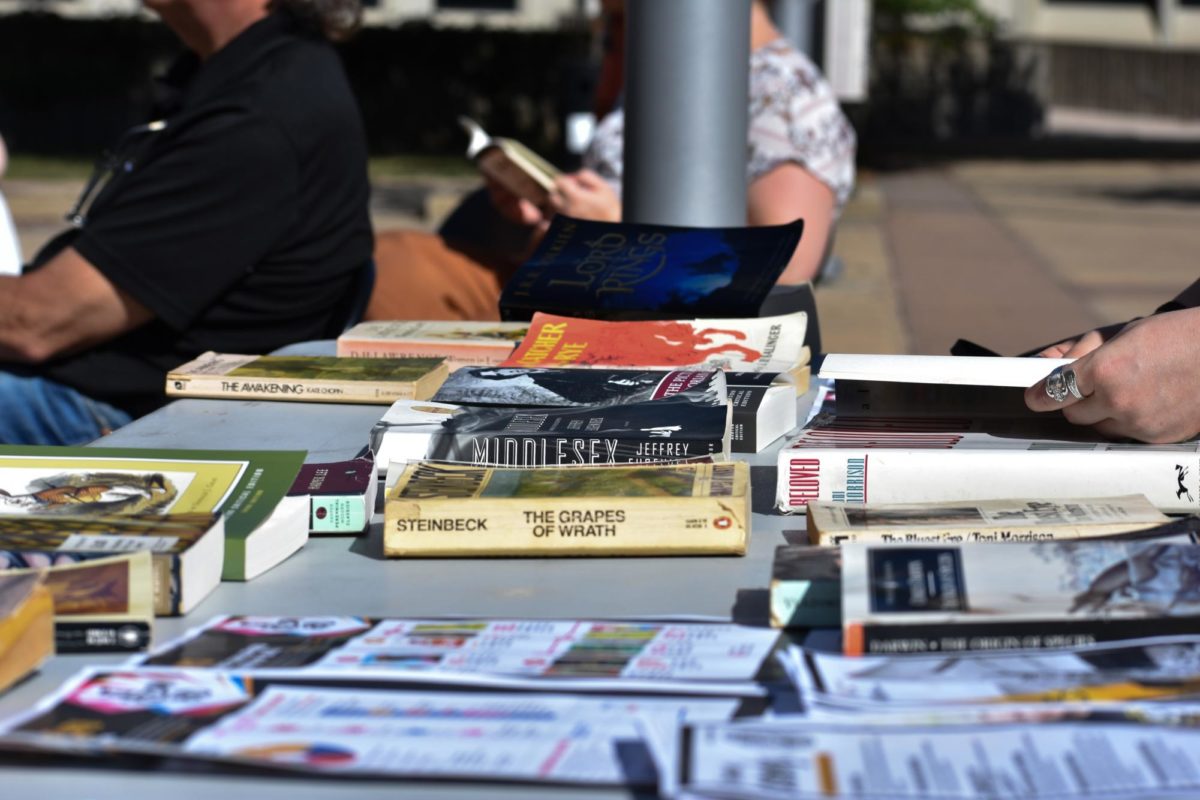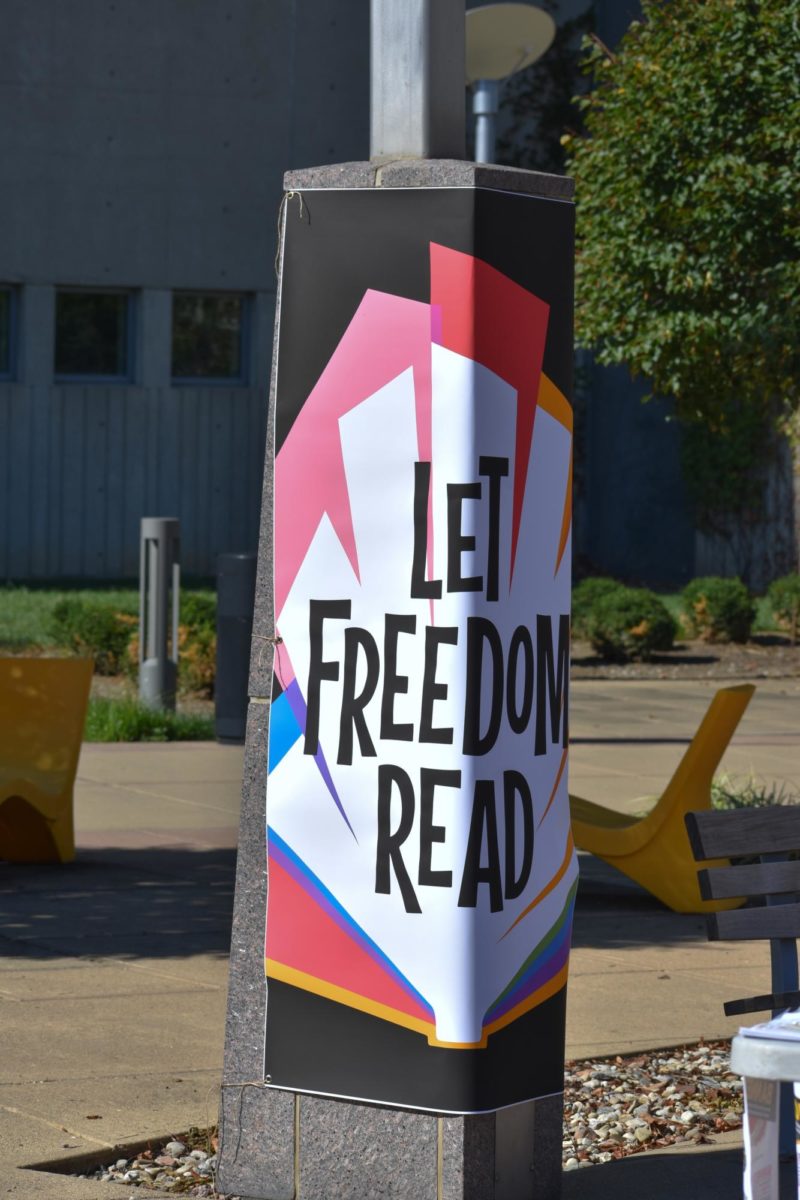The sun burned hot in a cloudless sky. The sounds of horns blared from a brass ensemble’s practice session. But the speakers read on, reciting passages from books that have, at one point or another in their publication history, been banned or challenged in the U.S.
Through the blazing noon of Oct. 3, Northern Kentucky University faculty and students occupied the plaza between Steely Library and Landrum Academic Center for a Banned Books Readout, organized by the Department of English in collaboration with Steely and part of the national Banned Books Week. Each speaker was scheduled to read for 10 minutes, one after another in quick succession.
A nearby table displayed a wide array of challenged classics from all eras, from Harper Lee’s “To Kill a Mockingbird” to Toni Morrison’s “Beloved,” from winner of the 2003 Pulitzer Prize “Middlesex” to “The Lord of the Rings.”
Some speakers brought to the podium their own titles of choice. College of Informatics Dean Kevin Kirby read the last few paragraphs from William S. Burroughs’ surrealist novel “Naked Lunch,” which has been banned before, and which he described as considered repulsive and offensive enough to risk being banned again.
“Books are important to what it means to be human—it’s to write and share. It’s even more important when people have the courage to share things that other people feel uncomfortable with and other people want to ban,” Kirby said.
Attempts to censor books in the U.S.—with 1,915 different titles facing restrictions in schools and public libraries nationwide—have risen by 20% this year compared to 2022, according to the American Library Association. The vast majority of challenged and banned books concern topics of gender identity, sexuality and racial justice, and many are written by LGBTQ+ authors and people of color. Supporters of censorship often cite a need to protect children from sexually explicit material and defend parental rights over their children’s reading choices.
“It’s happening more and more, and many of us feel like it’s not democratic,” said Kristine Yohe, an English professor specializing in Black literature, about the book banning efforts. “It’s not something that a democracy should be doing.”
For Yohe, who has experience in teaching banned books, a public readout of challenged titles speaks to their value as important literature. It also speaks against censorship in a public university and a democracy at large. She respects parents’ right to decide what their own children should read, but that does not justify banning literature for everybody else.
“I think a lot of the efforts of book banning are quite misguided,” Yohe said. “I think everybody has access to all kinds of material through their phones. I think students aren’t going to the library to get corrupted, you know?”
At NKU, the readout soon drew a crowd of students clustering in the shades of nearby seating areas and trees. A few took to the podium with excerpts from Vladimir Nabokov’s controversial “Lolita” and Malinda Lo’s award-winning “Last Night at the Telegraph Club.” Others sat back and listened as part of an assignment for their English class.
Chloe, a student who is considering a communications degree, enjoys listening to people read. While she thinks that some books are not very acceptable, banning them does not make sense to her. “There’s a lot to be learned [from them],” she said.
Students have responded favorably and powerfully to the teaching of challenged books like “Beloved,” Yohe said, as authors like Toni Morrison are open about difficult topics that are an unavoidable part of life.
Dean Kirby brought “Naked Lunch” to the readout not because he loves the book, but because he deems it an important part of culture and deserving of being heard. Nevertheless, the novel’s content is strong enough that Kirby felt a little scared reading it aloud in public.
College of Informatics and English faculty occupied most of the spots on the readout schedule. Honors College lecturer Casey Kuhajda is teaching a class on George Orwell’s “1984,” and his students picked the passage that he read at the event—one that discussed the dystopia’s methods for destroying words.
Challenges to reading materials in Kentucky libraries have tripled since 2022, with 70 titles facing restriction as of May this year. Maia Kobabe’s graphic memoir “Gender Queer” remains the most widely challenged book in the nation and in Kentucky, according to the American Library Association.
Yohe hopes that since education is different at the postsecondary level, universities will continue to enjoy academic freedom and be able to teach the literary works that matter, even if she finds the increase in censorship across the country alarming. She recalled a quote where Toni Morrison was asked about her difficulty writing “Beloved” as the novel depicts slavery, sexuality and violence.
“Toni Morrison said it was very hard for her to write, but she said, ‘If they can live it, I could write it,’” Yohe quoted. “In other words, if the enslaved people could live through that hell then she could manage to write it. And I say to my students more broadly, ‘If they can live it, and she can write it, we can read it.’”




